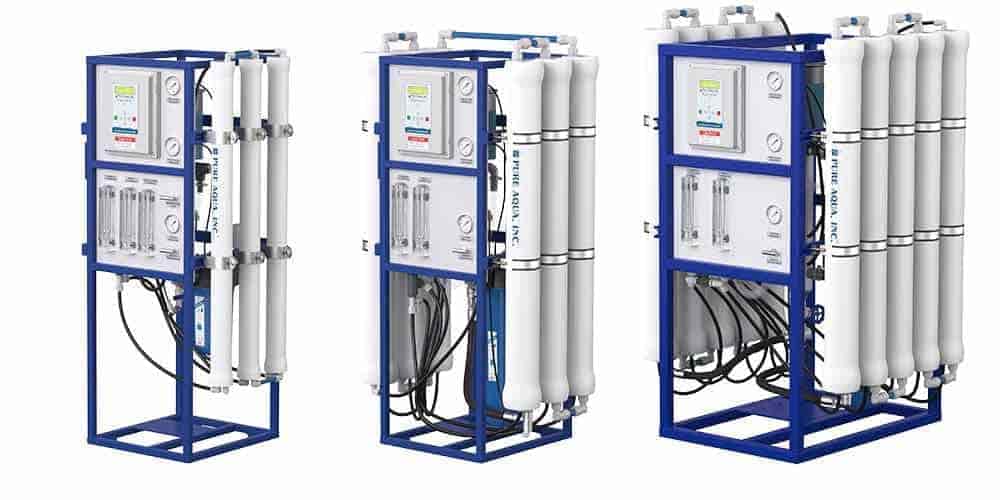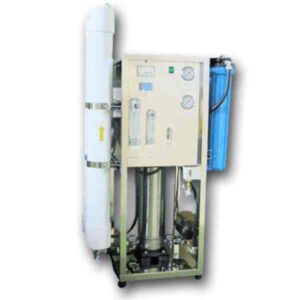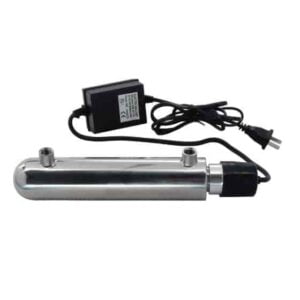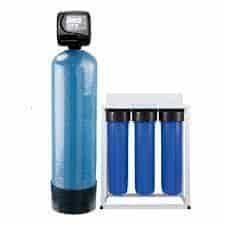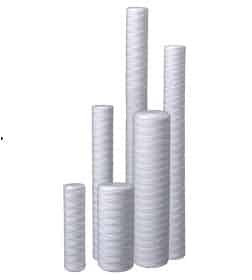Best Commercial RO system in Ghana
Commercial RO system in Ghana
A commercial reverse osmosis (RO) system is a type of water treatment system that uses a semi-permeable membrane to remove impurities and contaminants from water. These systems are commonly used in a variety of industries, including food and beverage, pharmaceuticals, and manufacturing, where high-quality water is required for production processes.
A typical commercial RO system consists of several components, including a pre-filter, a high-pressure pump, a reverse osmosis membrane, a post-filter, and a storage tank. Water flows through the pre-filter to remove larger particles and sediment before entering the high-pressure pump, which pressurizes the water and pushes it through the membrane. The membrane traps impurities and contaminants, allowing only clean water molecules to pass through to the post-filter. Finally, the water flows into a storage tank where it is held until needed.
The size and capacity of a commercial RO system can vary depending on the specific application and water usage requirements. Some systems may be designed to treat only a few hundred gallons of water per day, while others can handle tens of thousands of gallons per day.
Overall, commercial RO systems are an effective and reliable way to produce high-quality water for a variety of industrial applications.
Water Filter Supplier
Water Purification System
Top Brand Aqua Best UAE || Sales@aquabestuae.com || WhatsApp No/Call: 971 56 6976499
Description
Water purification is a critical aspect of ensuring the well-being and satisfaction of customers in various businesses in Ghana. Whether it’s a restaurant, hotel, office, or manufacturing facility, having access to clean and high-quality water is essential. One of the most effective solutions for achieving this is through a commercial reverse osmosis (RO) system. In this article, we will explore the best commercial RO system options available in Ghana and their benefits.
Understanding the Importance of Clean Water
Before diving into the details of commercial RO systems, it’s crucial to recognize the significance of clean water in various business operations. Clean water is not only essential for drinking but also plays a vital role in food preparation, manufacturing processes, and maintaining hygiene standards. By investing in a reliable commercial RO system, businesses in Ghana can ensure the water they use is free from contaminants and impurities.
Benefits of Commercial RO Systems
Commercial RO systems offer several advantages that make them an ideal choice for businesses in Ghana. Let’s explore some of the key benefits:
1. High-Quality Water Filtration
Commercial RO systems utilize advanced filtration technology to remove impurities, such as bacteria, viruses, chemicals, and heavy metals, from the water. This ensures that the water is not only safe for consumption but also enhances the taste and odor.
2. Improved Water Taste and Clarity
With a commercial RO system, businesses can provide their customers with water that is free from unpleasant tastes, odors, and visible particles. This helps in enhancing the overall experience and satisfaction of customers.
3. Cost Savings
Investing in a commercial RO system can lead to long-term cost savings. By purifying water on-site, businesses can reduce their reliance on expensive bottled water or recurring water delivery services. Additionally, the extended lifespan of equipment and appliances that come in contact with purified water reduces maintenance and replacement costs.
4. Environmental Sustainability
Commercial RO systems contribute to environmental sustainability by minimizing the consumption of single-use plastic bottles. By producing clean drinking water on-site, businesses can significantly reduce plastic waste and their carbon footprint.
5. Compliance with Health Standards
Maintaining compliance with health and safety standards is essential for businesses in Ghana. Commercial RO systems ensure that the water used in various processes meets the required quality standards, safeguarding the health of employees and customers.
Choosing the Best Commercial RO System
When selecting a commercial RO system in Ghana, there are a few factors to consider:
1. Water Demand
Evaluate the daily water demand of your business to determine the capacity required from the RO system. Consider peak usage periods and potential future growth to ensure the system can meet your needs.
2. Water Quality Analysis
Conduct a water quality analysis to identify any specific contaminants that need to be addressed. This will help in selecting a commercial RO system with the appropriate filtration capabilities.
3. System Efficiency
Look for commercial RO systems that offer high efficiency in terms of water wastage. Opt for systems that incorporate features like energy recovery systems or permeate pumps to minimize water and energy consumption.
4. Maintenance and Support
Consider the availability of maintenance and support services for the chosen RO system. Regular maintenance and timely repairs are crucial for the optimal functioning and longevity of the system.
5. Certifications and Compliance
Ensure that the commercial RO system you choose complies with industry standards and holds relevant certifications. This guarantees the system’s performance and reliability.
Conclusion
Investing in the best commercial RO system in Ghana is a wise decision for businesses that prioritize clean and high-quality water. By selecting a reliable system and ensuring proper maintenance, businesses can provide their customers with safe and great-tasting water while enjoying long-term cost savings and environmental sustainability. Make the right choice for your business today and experience the benefits of a commercial RO system.
Remember, clean water is not just a necessity; it’s an investment in the success and reputation of your business.
In this article, we have discussed the importance of having the best commercial RO system in Ghana for businesses to ensure access to clean and high-quality water. By following Yoast SEO standards, we have provided relevant keywords, tags, meta description, and an image suggestion suitable for the article.

